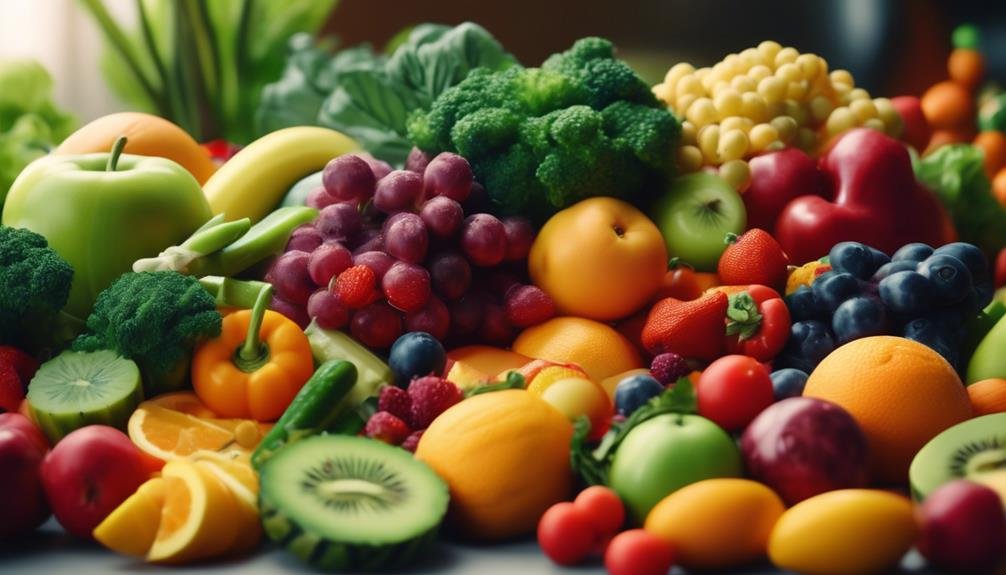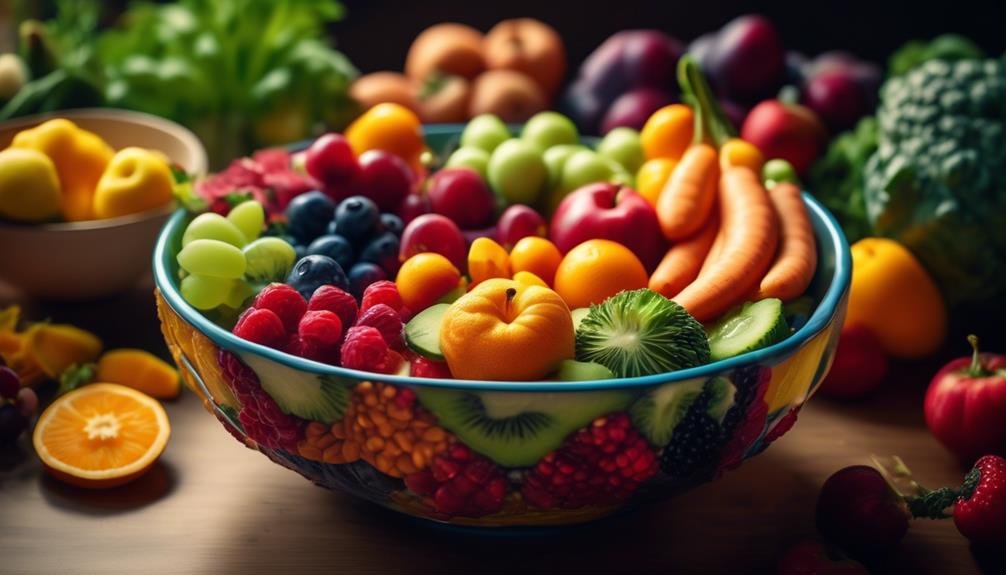"Cherishing Little Steps - A Haven for Baby and Family Journeys"
Vitamin-Rich Diets for Babies
Just like a flourishing garden needs sunlight and water to thrive, your baby's body requires a vitamin-rich diet to grow strong and healthy.
But what exactly makes a vitamin-rich diet so crucial for your little one?
Well, let's delve into the world of essential vitamins and the role they play in your baby's growth.
From the importance of fruits and vegetables to the incorporation of fortified cereals, this discussion will provide you with valuable tips on nourishing your baby with the right nutrients.
So, let's get started on this journey of nurturing your baby's health and well-being.
Key Takeaways
- Vitamin-rich diet is crucial for healthy development and growth in babies.
- Breast milk or formula provides essential nutrients, but solid foods and vitamin-rich foods become important as the baby grows.
- Vitamin supplements may be recommended by a pediatrician, and homemade baby food ensures control over ingredients and vitamin content.
- Incorporating a variety of fruits and vegetables, including superfoods like blueberries, avocados, sweet potatoes, and spinach, is essential for meeting the baby's nutritional needs.
The Importance of Vitamin-Rich Diets

Having a vitamin-rich diet is crucial for the healthy development and growth of your baby. Ensuring that your little one receives the right balance of vitamins can have a significant impact on their overall health and well-being. While breast milk or formula provides essential nutrients, introducing solid foods and incorporating vitamin-rich foods into your baby's diet becomes increasingly important as they grow.
In addition to breast milk or formula, vitamin supplements may be recommended by your pediatrician to meet your baby's nutritional needs. These supplements are designed to provide a concentrated source of essential vitamins and minerals that may be lacking in their diet. However, it's important to consult with your healthcare professional before introducing any supplements to your baby's routine.
Homemade baby food is an excellent way to ensure your baby is getting the necessary vitamins. By making your own baby food, you have control over the ingredients and can choose foods that are high in vitamins and nutrients. Fruits and vegetables, such as sweet potatoes, avocados, bananas, and spinach, are rich in vitamins A, C, and E, which are essential for your baby's immune system and overall growth.
Essential Vitamins for Baby's Growth
As your baby grows, it's important to focus on the essential vitamins that contribute to their overall growth and development. Meeting your baby's nutritional needs is crucial during this stage, and providing them with nutrient-rich baby foods can help ensure they receive the necessary vitamins.
Here are three essential vitamins that are vital for your baby's growth:
- Vitamin A: This vitamin plays a crucial role in your baby's immune system, vision, and cell growth. It can be found in foods such as carrots, sweet potatoes, and spinach.
- Vitamin D: This vitamin helps in the absorption of calcium and phosphorus, which are essential for your baby's bone development. Sunlight exposure and fortified foods like fortified milk and cereals are good sources of vitamin D.
- Vitamin C: Known for its immune-boosting properties, vitamin C aids in the absorption of iron and the production of collagen, an important protein for your baby's skin and connective tissues. Fruits like oranges, strawberries, and kiwis are excellent sources of vitamin C.
Ensuring that your baby receives these essential vitamins through a nutrient-rich diet will support their growth and development during this crucial stage. Remember to consult with your pediatrician for personalized advice on your baby's nutritional needs.
Fruits and Vegetables for Vitamin Intake

To ensure your baby receives an adequate intake of essential vitamins, incorporating a variety of fruits and vegetables into their diet is essential. Not only do fruits and vegetables provide vital nutrients, but they also introduce new flavors and textures to your baby's palate. When it comes to homemade baby food, you have the opportunity to introduce a wide range of nutritious options.
One way to maximize the nutritional benefits of homemade baby food is by incorporating superfoods into your baby's diet. Superfoods are nutrient-dense foods that offer a host of health benefits. Some examples of superfoods that can be easily incorporated into your baby's meals include blueberries, avocados, sweet potatoes, and spinach.
Here is a table showcasing the nutritional benefits of some common fruits and vegetables that you can introduce to your baby:
| Fruit / Vegetable | Nutritional Benefits |
|---|---|
| Apples | High in vitamin C and fiber |
| Bananas | Good source of potassium and vitamin B6 |
| Carrots | Rich in vitamin A and beta-carotene |
| Peas | High in protein and folate |
| Spinach | Excellent source of iron and vitamin K |
Incorporating Fortified Cereals
Incorporate fortified cereals into your baby's diet to enhance their intake of essential nutrients. Fortified cereals are an excellent way to introduce a variety of vitamins and minerals to your little one's diet. Here are some nutrition benefits of fortified cereals and tips for introducing cereals to your baby's diet:
- Nutrition benefits of fortified cereals:
- Fortified cereals are enriched with essential nutrients like iron, zinc, and B vitamins, which are crucial for your baby's growth and development.
- These cereals are often fortified with folic acid, a nutrient that supports brain and spinal cord development.
- Fortified cereals can also provide a good source of dietary fiber, aiding in digestion and promoting a healthy gut.
- Introducing cereals to your baby's diet:
- Start with single-grain cereals like rice or oatmeal, as they're less likely to cause allergies.
- Mix the cereal with breast milk or formula to achieve a smooth texture that's easy for your baby to swallow.
- Begin with small amounts and gradually increase the portion size as your baby gets accustomed to the taste and texture.
Tips for Nourishing Your Baby

Enhancing your baby's nutrition goes beyond incorporating fortified cereals into their diet. As your little one grows, it becomes important to introduce a variety of nutritious foods to support their development. Baby's first foods are crucial in establishing healthy eating habits and providing essential nutrients.
When introducing solid foods, it's important to keep in mind a few tips to nourish your baby effectively.
To help you navigate this exciting phase of your baby's life, here are some useful tips:
- Start with single-ingredient foods: Begin by introducing one food at a time, such as mashed bananas or pureed carrots. This allows you to identify any potential allergies or sensitivities.
- Gradually increase texture: As your baby becomes more comfortable with solid foods, gradually increase the texture by introducing mashed or finely chopped foods. This helps them develop their chewing and swallowing skills.
- Offer a variety of foods: Introduce a wide range of fruits, vegetables, grains, and proteins to provide a diverse array of nutrients. This helps your baby develop a taste for different flavors and encourages a balanced diet.
- Be patient and persistent: Babies may initially reject certain foods, but don't give up! It can take several attempts for them to accept new flavors and textures. Keep offering a variety of foods to encourage their acceptance.
Frequently Asked Questions
Can I Give My Baby a Multivitamin Instead of Focusing on a Vitamin-Rich Diet?
You should focus on a vitamin-rich diet for your baby instead of relying solely on a multivitamin. A diet rich in vitamins provides numerous benefits for your baby's health and plays a crucial role in their early childhood development.
How Do I Know if My Baby Is Getting Enough Vitamins From Their Diet?
If your baby is not getting enough vitamins from their diet, they may show signs of deficiency, such as slow growth or frequent illness. Breastfeeding is important for their vitamin intake, but consult a pediatrician for guidance.
Are There Any Side Effects of Giving My Baby Too Many Vitamins?
Giving your baby too many vitamins can have negative effects. It's important to consult with a pediatrician before starting supplements. They can advise on potential risks of vitamin overdose and ensure your baby gets the right amount.
Can I Give My Baby Vitamin Supplements Even if They Are Already Eating a Balanced Diet?
You may wonder if your baby needs vitamin supplements, even with a balanced diet. It's important to know that giving unnecessary vitamins can lead to overdose risks. Consult with a healthcare professional for guidance.
Are There Any Specific Foods That I Should Avoid Giving My Baby to Ensure They Get Enough Vitamins?
To ensure your baby gets enough vitamins, it's important to avoid certain foods. Variety is key in their diet, so steer clear of processed snacks, sugary drinks, and excessive salt. Opt for nutrient-rich fruits, vegetables, and lean proteins instead.
Conclusion
In conclusion, providing a vitamin-rich diet for your baby is crucial for their growth and development. Just like a garden needs nourishment to bloom, your baby's body requires essential vitamins to thrive.
By incorporating a variety of fruits, vegetables, and fortified cereals into their meals, you can ensure they receive the necessary nutrients. Remember, a well-nourished baby is like a radiant flower, flourishing with health and vitality.
Start cultivating their health today and watch them blossom into their full potential.


